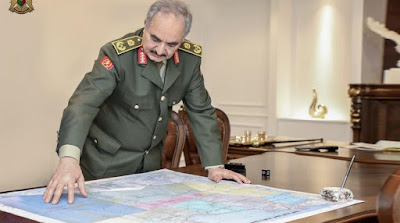Earlier this month, the Egyptian Ministry of Defense announced hiring a new Military Spokesperson, War Staff Colonel Gharib Abdel Hafez. The position of the military spokesperson is relatively new to the Egyptian society. Each of the three former army spokespersons played an important role in strengthening the civil-military bond, on the domestic level, and refuting the many unfair accusations thrown at the military institution, in western media. The new military spokesperson is expected to play an equally important role in the coming critical phase of reshaping Egypt’s military and political coalitions, worldwide.
The Armed Forces is the most important entity in Egypt. The centuries-old institution, which enjoys a state of political and economic autonomy, plays a significant role in almost all life areas. That does not only include the military’s traditional role of persevering border security and preparedness for warfare engagement. Proudly speaking, the Egyptian military is ranked by the Global Firepower Index as the second strongest military in the Middle East region, and among the top 12 militaries in the world.
However, the role of the Egyptian military extends way beyond its traditional war-related profile, to also include the non-traditional role of providing domestic social and economic services that balance the civilian government shortages, when necessary. The success of the Egyptian civil government, with the help of the military institution, in handling the infinite number of health, social, and economic challenges instigated by the COVID-19 pandemic, last year, is the latest proof on that argument.
On the political level, the Egyptian Armed Forces had not delayed or replaced the civil state’s quest to democratic development, as most western analysts feared, after the 2011 revolution. On the contrary, the military institution, which managed to survive the fall of the regime, at that time, due to its independent status and unconditional bias to the will of the people, contributed to facilitating the major political transitions that took place, over the first five years following the revolution. By freeing people from fear, it has become easier for the Egyptians to participate in elections and decide for their future.
The entire Middle East region is still struggling with containing the many negative consequences of the Arab Spring, including but are not limited to states failure, foreign interventions, proxy wars, civil wars, and the spread of terrorist organizations. Egypt, thanks to its strong and politically active military, is one of two countries that survived the Arab Spring and managed to restore public order, preserve the cohesion of the national state, and re-establish a stable system of governance.
Despite its critical role and huge influence on the daily lives of the Egyptian public, the Armed Forces remained, for decades, a closed and obscure entity, for the majority of Egyptians. There was no direct communication between the military and the public. Military news used to be sent by the Ministry of Defense, in a written communique format, to state-owned media, which used to publish them without editing. Only after the 2011 revolution, pushed by the military’s need to communicate with the public citizens, the position of the military spokesperson appeared.
Today, the Egyptian military institution does not only have a website or active daily communications with local and international media, but it also runs pages with vast following on various social media platforms. For example, the military spokesperson has got more than 8 million followers on Facebook, and more than 3 million on Twitter. This openness in the relationship between the Armed Forces and the Egyptian people played a significant role, over the past ten years, in helping Egypt survive and thrive.
Like his three predecessors, the new spokesperson of the Egyptian Armed Forces, Colonel Gharib Abdel Hafez, has got an impressive resume with a long list of military and civilian professional and academic merits. In addition to his remarkable military service record, he received several diplomas from international academic institutions in Germany, Greece, and China. He also studied for a Master’s Degree in International Relations. There is no doubt that he has been carefully selected as the right fit for the next phase, through which Egypt is opening up to new regional coalitions and international alliances. We wish him success in this crucial mission.



